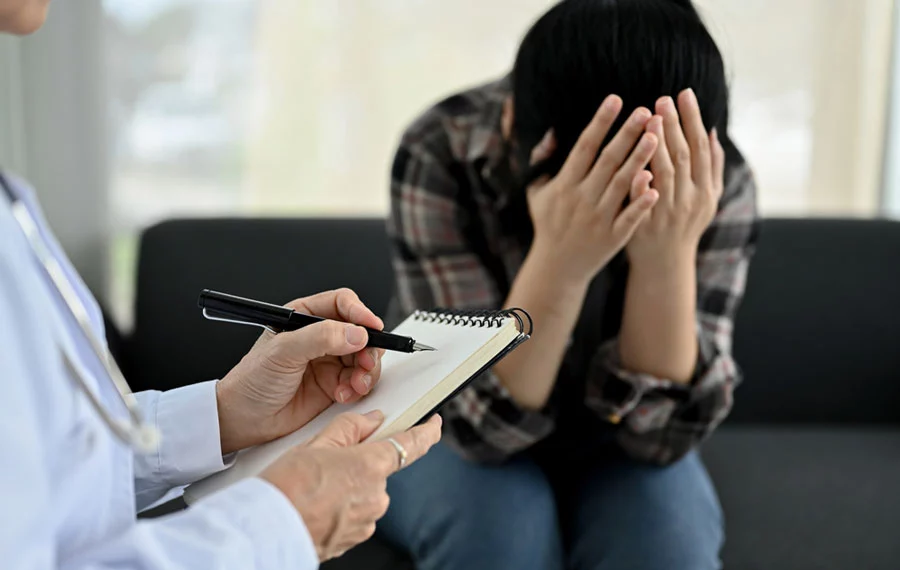Dual Diagnosis Treatment Orange County
Orange County Dual Diagnosis Treatment Center
Managing a substance abuse problem or any number of mental health disorders is difficult. In reality, 23 million persons in the United States have experienced problematic drug use at some point in their life, as reported by the National Institutes of Health.
When a person with a substance use disorder simultaneously struggles with mental health issues, however, the situation becomes even more dire. In reality, these two states frequently coexist. It is crucial in these cases to take part in a dual diagnosis treatment program. There is hope for recovery from mental illness and substance abuse at a dual-diagnosis treatment center.
If you’re looking for a top-tier dual diagnosis treatment Orange County option, South Shores Recovery provides the tools you need for success. Keep reading for more information on our solutions for co-occurring disorders.
Two Disorders In One

Do you find yourself pondering, “what is dual diagnosis?” Are you curious about how dual diagnosis treatment centers can help you with both of your challenges? South Shores Recovery specializes in dual diagnosis treatment and a wide variety of mental health disorders.
A person with a dual diagnosis is dealing with the effects of more than one health problem at once. Having a dual diagnosis means that a person has been identified as suffering from both a substance use disorder and a mental health disorder. Substance abuse often co-occurs with the following mental health disorders:
- Anxiety
- Personality Disorder
- Eating Disorders
- PTSD
People with a dual illness often abuse a variety of substances, including heroin, meth, marijuana, alcohol, and painkillers. This highlights the need for dual diagnosis treatment centers that help both drug addiction and mental health disorders.
Mechanics of a Dual Diagnosis Treatment Center
Therapists in a dual diagnosis treatment program will work with you to identify and address the underlying mental health disorders at the center of your drug and alcohol addiction. People require a dual diagnosis treatment program for two main reasons.
The fact that many people with mental health problems do not receive dual diagnosis treatment means that they often turn to substances like alcohol or drugs to cope with their symptoms. Another factor is that long-term drug abuse alters brain chemistry, leading to the emergence of a mental health problem among its users. The origins of a dual diagnosis are context-specific.
Dealing With a Trauma-Related Mental Health Disorder
Substance abuse often stems from unresolved emotional issues or trauma from the past, both of which can be addressed in a dual diagnosis treatment program. When you address issues with your mental health and substance use, you might begin to experience the calm necessary for healing.
Once a person has dealt with their own personal trauma and mental health difficulties, they are in a much stronger position to combat their addiction. Rather than being forced into treatment, such an opportunity be made appealing for a loved one with a look at all that facilities like ours at South Shores offer.
If you’re dealing with both mental illness and substance misuse, you or your loved one need the kind of comprehensive care that can only be found at a dual diagnosis treatment center. Many different forms of dual diagnosis treatment, including cognitive behavioral therapy (CBT) and medication-assisted therapy (MAT), are used in a dual diagnosis program to help individuals overcome their mental health conditions. This is all included in each clients’ personalized treatment plan.
Begin Dual Diagnosis Treatment – Call Now!
Medication Assisted Treatment for Dual Diagnosis
Medication-assisted treatment (MAT) entails prescribing the medications needed to alleviate mental health conditions, withdrawals, and cravings, which may persist even after dual diagnosis treatment has ended. Meeting with a psychiatrist who specializes in addiction on a regular basis is essential for ensuring that prescription drugs are effectively relieving symptoms and aiding in recovery as part of your personalized treatment plan.
Why a Dual Diagnosis?

Although there is a lot of evidence suggesting a correlation between substance abuse and mental health issues, this does not prove that one problem causes the other or leads to a dual diagnosis.
While there has been a lot of study into the topic of dual diagnosis, researchers and addiction specialists still don’t have a firm grasp on why so many people struggle with both substance abuse and mental health issues simultaneously. There is still a lot to be learned regarding dual diagnosis.
However, four main explanations may be offered for the existence of dual diagnosis:
Genetics
There are certain common risk factors between substance abuse and mental health issues.
There are certain shared risk factors across the various substance use disorders and mental health illnesses, notwithstanding their differences.
Depending on the study, genetics may account for as much as 60% of a person’s susceptibility to addiction. Just as there is a hereditary component to all physical diseases, studies reveal the same for all major mental health issues. The heritability of depression and anxiety ranges from 20% to 45%, while that of bipolar disorder and schizophrenia is well over 75%. Both of these combined serve as catalysts for co occurring disorders.
Stress
Among the identified risk factors for addiction and relapse, stress stands out. The National Alliance on Mental Illness (NAMI) reports that stress can exacerbate existing mental health symptoms and drug use disorders.
In many cases, substance abuse can be traced back to a traumatic event. Psychological disorders, such as post-traumatic stress disorder (PTSD), are another possible outcome of trauma (post-traumatic stress disorder) and co occurring disorders.
Self Medication
Substance abuse and alcoholism can be exacerbated by mental health issues, which is the primary challenge with co occurring disorders.
Self-medication with alcohol and drugs is common among those who suffer from mental health illnesses, especially those who have not yet been identified. Self-medication describes this practice.
Self-medication may provide temporary comfort, but it does nothing to treat the underlying cause, so the symptoms may return or even worsen. According to studies, some persons who self-medicate do so even after their symptoms deteriorate. Self-medication is associated with an increased likelihood of developing an addiction to alcohol or drugs. It’s worth noting that not all of those with co occurring disorders do so to self medicate – but a fair amount of them do.
Furthermore, the chemical and functional changes in the brain that are caused by mental health issues may increase vulnerability to addiction. We need to learn more about this topic through extensive study.
Substance Misuse Pushing the Psychological Disorder
Finally, drug abuse might bring on psychological problems.
Substance misuse can sometimes be an indicator of underlying mental health issues.
This research reveals that chronic marijuana use may raise the likelihood of psychosis and negative affective states. Those who start smoking pot at a young age are more likely to experience negative outcomes later in life.
Some persons who struggle with alcoholism or drug abuse also experience mental health issues, including depression or anxiety.
24 Hour Addiction Helpline – Reach out Now!
Positive Effects of a Comprehensive Treatment Plan for Dual Diagnosis
The advantages of a therapy program for those with both diagnoses are numerous.
Reduces Relapse
Clients can benefit from learning more about their disease by investigating the origins of their problem. Then those in recovery can learn to steer clear of situations that might otherwise result in a relapse.
South Shore’s Recovery can tailor a treatment program to each client’s needs thanks to the facility’s usage of a dual diagnosis treatment program.
As a result, you won’t rack up extra costs from participating in multiple similar treatment programs. A dual diagnosis treatment program eliminates the need for multiple forms of therapy, as it’s all combined into one.
What are the Benefits of Dual Diagnosis Treatment?

A More Accurate Psychological Evaluation
When a client is suspected of having more than one condition, they will be put through an evaluation to help doctors and therapists narrow down the possibilities. They will investigate the timeline of events in an effort to discover which came first: mental illness or substance usage. After this is done, they can decide on the best course of treatment and create a customized strategy to implement it.
Confidence In Recovery
The client’s ability to manage and take control of their substance misuse and mental illness improves dramatically when they are able to learn new coping strategies. Clients will become aware of their triggers and develop strategies to deal with them or find other solutions if they are not avoidable. Learning coping mechanisms can assist people in avoiding returning to substance abuse and instead live a drug-free life.
Solo and Group Therapy
Group and individual therapy sessions are crucial aspects of every recovery program. Clients can feel comfortable opening up to other people who have experienced similar things in a group therapy setting. They can take in the guidance of others and get the benefits of social interaction.
Therapy sessions with just one counselor can be tailored specifically to the needs of the patient. If they feel safe with their therapist, they can have more open conversations and work together to find solutions to their problems.
Holistic Healing

Dual diagnosis treatment that takes a more holistic approach can be quite effective. It takes into account the full client and seeks to achieve harmony between the patient’s mental and physical health rather than just treating symptoms. Yoga, massage therapy, meditation, and healthy eating are all examples of complementary and alternative medicine.
The controlled, therapeutic atmosphere of an inpatient mental health and customized substance abuse treatment center allows for the adoption of models of addiction treatment that have been shown to be effective. Inpatients in dual diagnosis treatment centers typically don’t leave until they’ve finished their prescribed course of therapy.
Clients have nothing to worry about but getting well during their stay. In addition, they have access to doctors, counselors, and psychologists who focus on treating people with addiction and co-occurring disorders at all hours of the day.
The effects of a person’s dual diagnosis of a mental illness and a personality disorder extend well beyond the affected person and their immediate family. It is also challenging for the mental health specialists who are leading the affected person’s treatment to disentangle the causes of the individual’s behavior.
For a full and speedy recovery, as well as an improvement in one’s general mood, this is an essential step. Counselors, psychologists, and psychiatrists need answers to the following questions before they can develop an effective treatment plan:
Detox and Dual Diagnosis Help – Reach out Now!
How Does Alcohol Factor In?
Is the patient suffering from severe depression to the point where they would require medication? Other mental health conditions that frequently call for medication include mania, anxiety, and schizophrenia.
Addiction makes it difficult to determine what’s really causing a person’s bad behavior. Psychiatric diseases are diagnosed based on the presence of a specific constellation of signs and symptoms that, when taken together, form a syndrome.
So, while describing mild symptoms of mental disease would lead one to conclude that the person is simply abusing substances, there is a threshold beyond which those symptoms begin to compound into a genuine psychiatric disorder. This is where a dual diagnosis of addiction can be made.
What is the Textbook Definition of Mental Illness?

Diagnostic and Statistical Manual of Mental Disorders, Fifth Edition (DSM-V) is used by mental health practitioners to help in the identification of mental illness. There have been calls in the psychiatric community for dual diagnosis to be given its own entry, but so far this has not happened.
The different definitions of addiction and related behavioral disorders are therefore relied upon by psychiatrists, psychologists, therapists, and addiction counselors.
Outline of diagnosis includes:
- Taking more of the drug than is recommended, or taking it for a longer period of time.
- The desire to limit or abstain from substance use combined with an inability to do so.
- Investing a great deal of time into obtaining, consuming, or recuperating from the drug.
- Habit-forming yearnings and needs to utilize the drug.
- Not being able to fulfill one’s responsibilities at work, at home, or in school as one should due to substance abuse.
- Continued use despite knowing it’s destroying your relationships.
- Giving up significant facets of one’s social, professional, or recreational life due to drug or alcohol usage.
- Use of drugs on a repeated basis despite the negative effects.
- Using drugs or alcohol while knowing that doing so may have contributed to or exacerbated an existing health concern
When taken separately, each of these conditions is a symptom. They form a condition when taken as a whole. Addiction specialists use the distinct signs of mental illnesses like despair and anxiety to confirm a dual diagnosis.
South Shores Recovery Can Help with Dual Diagnosis
At South Shores Recovery, we’re well-equipped to handle your dual diagnosis treatment challenges. Our expert team of professionals has years of experience in helping clients manage their symptoms and prevent relapse.
For more info on how we can help you do the same, contact a member of our admissions team.
related pages
- Benzodiazepine Detox
- Opiate And Opioid Detox
- Suboxone Detox
- Behavioral And CBT Therapy
- Dual Diagnosis Disorders
- Mental Health Treatment
- Depression And Mood Disorders
- Alcohol Detox
- Drug Detox Programs
- Addiction Treatment Program
- Mental Health Therapies
- Drug Rehab Orange County
- Drug Rehab Santa Ana
- Couples Rehab Orange County
- Alcohol Rehab Orange County
- Health Net Rehab Center
- Fentanyl Detox
- Dual Diagnosis Treatment Orange County
- Drug Rehab that Accepts TRICARE
- TRICARE Alcohol Rehab
- Alcohol Rehab Santa Ana
- Crack Detox
- Alcohol Detox Orange County
- Heroin Detox
- Medication Assisted Treatment Orange County
- Orange County Drug Detox
